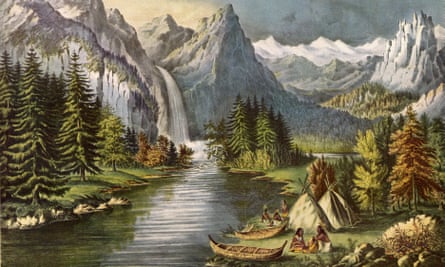Does the federal government mean to cede the territory of the United States back to the Native Americans?
The US Citizenship and Immigration Services (USCIS) has altered its mission statement, removing the characterization of America as a “nation of immigrants” in order to emphasize the new goal of “securing the homeland”. Some critics made the point that most citizens are immigrants or their descendants, while others noted that most Americans believed that immigration should remain stable or increase.
Yet the problem with the change in language lies deeper. According to our own legal tradition, Americans claim sovereignty over the territory of the US as immigrants, precisely because the territories in question were someone else’s homeland: the Native Americans’.
Since our country exists, we don’t ask ourselves how or why. The legal foundation of the federal claim to dominion over territory is something called the Doctrine of Discovery, a notion that goes back five centuries. As European explorers sought new maritime passages and found new lands, popes granted European powers the authority to “invade, search out, capture, vanquish and subdue” the people they found.
Portugal, Spain, France and England claimed territory by planting a flag, a symbolic action known as “discovery”. It made no difference whether the land in question was inhabited or not, since only Christians had conferred upon themselves the right to “discover” in this sense. By the logic of the papal bulls, and that of later charters to English explorers made by the English king or queen, indigenous peoples had no rights to land or to legal recognition of any kind. Only immigrants did.
The young American republic preserved this European doctrine. The US supreme court formalized the Doctrine of Discovery in three famous cases of 1823, 1831 and 1832. Chief Justice John Marshall took for granted the obvious fact that America was the homeland of the Native Americans, “the rightful occupants of the soil”. By the logic of “discovery”, Native Americans had no rights because America was their homeland: “Their power to dispose of the soil at their own will to whomsoever they pleased was denied by the original fundamental principle that discovery gave exclusive title to those who made it.”

In American law, to have a homeland established no sovereignty over territory; only immigration created such authority. According to Marshall, English charters and claims had established an “absolute and complete” title to the land of North America, which then “passed to the United States” in 1776. The judicial magic of creating sovereignty and property is performed on behalf of immigrants and only on behalf of immigrants.
From the perspective of modern human rights, or even of simple logic, there is much to criticize in the Doctrine of Discovery and in these rulings. In light of the first amendment of the constitution, separating church and state, papal bulls seem untenable as a source of American jurisprudence. When Marshall writes that “conquest gives a title that the courts of the conqueror cannot deny”, it is easy to wonder whether anything more is being claimed in his rulings than that might makes right. Native American scholars have made all of these points, and aboriginal activists here and around the world have asked the pope to repeal the original bulls.
However flawed it may be, the Doctrine of Discovery is the law of the land, affirmed regularly by our highest court. In the 21st century, in New York v Oneida Indian Nation of New York, the supreme court cited Marshall’s rulings and relied upon the Doctrine of Discovery as the basis of the federal government’s dominion over land once controlled by Native Americans – which is to say, the entirety of the United States of America.
The American claim to American land is that Native Americans had a homeland but no dominion over it, since sovereignty automatically shifted to immigrants. If the federal government no longer defines the America as a “nation of immigrants”, it abandons, by its own logic, the claim to sovereignty over the land. If US policy is now, instead, to protect a “homeland”, that would mean restoring the rights of the Native Americans to the entirety of the US.
To be sure, a mission statement does not itself make law. But it expresses an attitude that is quite common in the Trump administration and indeed in both houses of Congress, one that denies the premise of the Doctrine of Discovery, disables the rulings of the supreme court, and reopens the question of the sovereignty of the US over territory. Marshall admitted that territorial control by immigration, the “pretension of converting the discovery of an inhabited territory into conquest” might appear “extravagant”. Yet the Doctrine of Discovery prevails, he asserts, so long as the “principle has been asserted in the first instance, and afterwards sustained”.

If the federal government claims that the US is a nation of natives rather than immigrants, that test is no longer met. If the federal government no longer asserts the principle on which its own sovereignty is based, no longer sustains the Doctrine of Discovery. Following Marshall’s reasoning, Native Americans would then have, in his words, a “legal and just claim to retain possession” of what is now the United States of America.
We have a responsibility to know and face our history, the indefensible as well as the praiseworthy. To deny our past as immigrants is to deny ourselves the chance of understanding who we are, for better and for worse. It is also, following the very logic and law of America, to abandon our claim to the dominion over territory, and to restore the land to those who first called it home.
- Timothy Snyder is the Levin professor of history at Yale University. He is the author, most recently, of The Road to Unfreedom: Russia, Europe, America.
